You are using an out of date browser. It may not display this or other websites correctly.
You should upgrade or use an alternative browser.
You should upgrade or use an alternative browser.
Tinnitus Research Initiative (TRI) 2023 Conference
- Thread starter Hazel
- Start date
More options
Who Replied?- Dec 3, 2022
- 256
- Tinnitus Since
- 2012. Worsened 2022.
- Cause of Tinnitus
- Primarily loud music. Secondary - ETD + TMJ
Stinks of "what's an easy way to get funding without having to actually produce any results at the end of the term."Two presentations on CBT
- Feb 11, 2019
- 801
- Tinnitus Since
- 01/2014
- Cause of Tinnitus
- Headcold/Flu
I had formerly posted this in regard to another ludicrous CBT study:
"The Impact of Tinnitus on Working Memory Capacity" from the International Journal of Audiology:
Perhaps a study should be done on "The Impact of Having a Pit Bull With His Fangs Imbedded in Your Neck When You Are Trying To Write Complicated Calculus Equations."
The sheer idiocy of so much highly vaunted scientific research.
"The Impact of Tinnitus on Working Memory Capacity" from the International Journal of Audiology:
Perhaps a study should be done on "The Impact of Having a Pit Bull With His Fangs Imbedded in Your Neck When You Are Trying To Write Complicated Calculus Equations."
The sheer idiocy of so much highly vaunted scientific research.
Well done guys. I've just followed @ZFire's lead with another donation and tapped the ball into the net.
Every one of you who donated are legends. ♥
- Aug 7, 2021
- 1,521
- Tinnitus Since
- 2012 (mild) & 04/2021 (severe)
- Cause of Tinnitus
- Ototoxicity (2012) Unknown-likely noise induce (2021)
Lmao...
For the record, I'm not loaded with money over here, far from it. But I like being charitable for a good cause.
 This conference is really important.
This conference is really important.Great job everyone. Big shout out to @UKBloke especially for finishing it off. Mission accomplished!
And $26 left over for one of Dr. De Ridder's 'cocktails'Big shout out to @UKBloke especially for finishing it off. Mission accomplished!

- Jul 8, 2019
- 1,185
- Tinnitus Since
- 1991
- Cause of Tinnitus
- Loud Music / family history
'kin 'ell imagine that lol. Mine's a Low Dose Naltrexone on the rocksAnd $26 left over for one of Dr. De Ridder's 'cocktails'

I wonder if you might slip in a word about sub-types of tinnitus, per the conversation with Dr. Michael Golenhofen. After listening to his very thoughtful comments, it seems pretty clear that clinicians are just about clueless when it comes to having an informed and informative discussion with a tinnitus sufferer about tinnitus sub-types.
Those of us who started out with life-altering tinnitus and hyperacusis are left to piece this together ourselves and navigate various medical systems -- allopathic, Chinese, Ayurvedic. For me, this included sound therapy/maskers, Bluetooth use TinnitusPlay app sounds, Ayurveda, craniosacral treatment, TRT 2+ times, off-label drugs such as Klonopin and Gabapentin, acupuncture, Feldenkreis, rolfing, neurologist, counselor, and more.
EACH of those approaches may have taken 1 to 8 tries with different practitioners before finding one who could help. So, let's say 25 to 30 practitioners to put together a complete treatment plan that showed results. Not to mention over $125,000 spent (including much from retirement accounts -- and I realize how fortunate I was to have that as a resource), particularly during the first four years, but that continues to this day as acupuncture, Ayurveda, craniosacral therapy, and even hearing aids are not covered by American health care.
Thank you so much for presenting at the conference! You have incorporated powerful points. I wonder how the professionals, and I use the term advisedly, will respond.
Those of us who started out with life-altering tinnitus and hyperacusis are left to piece this together ourselves and navigate various medical systems -- allopathic, Chinese, Ayurvedic. For me, this included sound therapy/maskers, Bluetooth use TinnitusPlay app sounds, Ayurveda, craniosacral treatment, TRT 2+ times, off-label drugs such as Klonopin and Gabapentin, acupuncture, Feldenkreis, rolfing, neurologist, counselor, and more.
EACH of those approaches may have taken 1 to 8 tries with different practitioners before finding one who could help. So, let's say 25 to 30 practitioners to put together a complete treatment plan that showed results. Not to mention over $125,000 spent (including much from retirement accounts -- and I realize how fortunate I was to have that as a resource), particularly during the first four years, but that continues to this day as acupuncture, Ayurveda, craniosacral therapy, and even hearing aids are not covered by American health care.
Thank you so much for presenting at the conference! You have incorporated powerful points. I wonder how the professionals, and I use the term advisedly, will respond.
A genuine sincere well done and appreciation for those of you who have donated, there were a fair few and you let it be known and rightly so!
However, it did strike a bit of a chord as I am one of those who is unable to donate and my displease around the lack of ability to do so was amplified after reading the comment.
I've not worked for months, my business is destined to collapse very shortly. I'm not even sure if I can pay the staff I have left this month. Let alone all the bills and house payments I have to pay for myself. Just another burden created by tinnitus leading to the spiralling anxiety and depression.
In regards to this comment, from what I've seen post wise from @Damocles, I believe he means no malicious intent.and if I don't see that bar full before next Tuesday, I'll just assume the majority of us like living with the permanent, ever worsening screech of a creature from the darkest depths of an unnamed realm, inside our heads.
However, it did strike a bit of a chord as I am one of those who is unable to donate and my displease around the lack of ability to do so was amplified after reading the comment.
I've not worked for months, my business is destined to collapse very shortly. I'm not even sure if I can pay the staff I have left this month. Let alone all the bills and house payments I have to pay for myself. Just another burden created by tinnitus leading to the spiralling anxiety and depression.
I for one appreciated the push by @Damocles - sometimes people need that kind of wakening up. I didn't sense any malicious intent. And like he went on to explain, he comes from not a financially strong position at the moment. He could have put that donation he made towards paying off his debt, but chose otherwise. That's pretty humbling.
Speaking of which, it is my impression from over the years that very often the least fortunate are the most willing to donate, whereas it's not uncommon at all to see a person expressing to be in the seriously wealthy range and not give a penny. There are of course exceptions to this. While an interesting topic, discussing the dynamics of donations is better saved for another day and another thread.
@Hardwell, please don't feel discouraged. You have already become a Benefactor earlier, that means a lot - thank you. I hope you improve and are able to return to work. It is indeed a vicious circle.
 @ZFire, thumbs up for your creativity with the challenge! @UKBloke, cheers for the awesome finish. @tpj, heartfelt thanks for your deep generosity. And for every single one of you who took part in this drive:
@ZFire, thumbs up for your creativity with the challenge! @UKBloke, cheers for the awesome finish. @tpj, heartfelt thanks for your deep generosity. And for every single one of you who took part in this drive: 
Last but not least, those who wanted to take part, but couldn't for whatever reason, All of your contributions matter too, which can come in many forms, e.g., helping other folks on the forums through your experiences and simply by being a positive force.
All of your contributions matter too, which can come in many forms, e.g., helping other folks on the forums through your experiences and simply by being a positive force.
I'll step out now and let @Hazel make the next update, but for those interested in some stats:

Speaking of which, it is my impression from over the years that very often the least fortunate are the most willing to donate, whereas it's not uncommon at all to see a person expressing to be in the seriously wealthy range and not give a penny. There are of course exceptions to this. While an interesting topic, discussing the dynamics of donations is better saved for another day and another thread.
@Hardwell, please don't feel discouraged. You have already become a Benefactor earlier, that means a lot - thank you. I hope you improve and are able to return to work. It is indeed a vicious circle.
 @ZFire, thumbs up for your creativity with the challenge! @UKBloke, cheers for the awesome finish. @tpj, heartfelt thanks for your deep generosity. And for every single one of you who took part in this drive:
@ZFire, thumbs up for your creativity with the challenge! @UKBloke, cheers for the awesome finish. @tpj, heartfelt thanks for your deep generosity. And for every single one of you who took part in this drive: 
Last but not least, those who wanted to take part, but couldn't for whatever reason,
 All of your contributions matter too, which can come in many forms, e.g., helping other folks on the forums through your experiences and simply by being a positive force.
All of your contributions matter too, which can come in many forms, e.g., helping other folks on the forums through your experiences and simply by being a positive force.I'll step out now and let @Hazel make the next update, but for those interested in some stats:
- Oct 24, 2017
- 857
- Tinnitus Since
- 10/2017
- Cause of Tinnitus
- one-sided hearing loss (of unknown origin)
Thanks, I appreciate the kind words! And sorry to hear about your struggles finding proper treatment, it's a common experience unfortunately.I wonder if you might slip in a word about sub-types of tinnitus, per the conversation with Dr. Michael Golenhofen. After listening to his very thoughtful comments, it seems pretty clear that clinicians are just about clueless when it comes to having an informed and informative discussion with a tinnitus sufferer about tinnitus sub-types.
Those of us who started out with life-altering tinnitus and hyperacusis are left to piece this together ourselves and navigate various medical systems -- allopathic, Chinese, Ayurvedic. For me, this included sound therapy/maskers, Bluetooth use TinnitusPlay app sounds, Ayurveda, craniosacral treatment, TRT 2+ times, off-label drugs such as Klonopin and Gabapentin, acupuncture, Feldenkreis, rolfing, neurologist, counselor, and more.
EACH of those approaches may have taken 1 to 8 tries with different practitioners before finding one who could help. So, let's say 25 to 30 practitioners to put together a complete treatment plan that showed results. Not to mention over $125,000 spent (including much from retirement accounts -- and I realize how fortunate I was to have that as a resource), particularly during the first four years, but that continues to this day as acupuncture, Ayurveda, craniosacral therapy, and even hearing aids are not covered by American health care.
Thank you so much for presenting at the conference! You have incorporated powerful points. I wonder how the professionals, and I use the term advisedly, will respond.
Dr. Golenhofen is at the conference by the way. I like his messaging indeed. The subtyping thing was all the rage in tinnitus research a few years ago but now you barely hear about it. When it comes to clinical trials, it is my firm belief we need to focus them much more specifically at different groups of tinnitus sufferers.
As for my talk, I'm mostly worried about whether there will still be anyone present by the time I give my talk, as it's literally the last talk of the last session of the last day, many might have flown off by then, haha! Anyway, I will do my best, and of course it's not just about the talk itself, I'm taking the opportunity to convey our points during the informal networking/coffee breaks and such, which in my experience is where the real action happens!
@Hazel, this makes me so angry. It shows what is important for these people. Money. Their grants, research papers, fame, recognition, having a good time at the conference, etc. Sufferers? Meh, they come last. You should be given a prominent and an exclusive slot - so everyone can and should attend.As for my talk, I'm mostly worried about whether there will still be anyone present by the time I give my talk, as it's literally the last talk of the last session of the last day, many might have flown off by then, haha! Anyway, I will do my best, and of course it's not just about the talk itself, I'm taking the opportunity to convey our points during the informal networking/coffee breaks and such, which in my experience is where the real action happens!
This is so dehumanizing, demoralizing, demotivating, devastating. Maybe it is not too late - plead with the organizers to swap slots, you never know.
And thank you for your work and time.
P.S. The content of the conference does not inspire a lot of hope. Sessions 1, 3, 5 and 9 have something of interest. The rest, especially the CBT parts, looks a waste of time. But maybe I missed something.
I can't help but notice zero presence from folks from Boston's Harvard/Massachusetts General Hospital. So much for cutting edge tinnitus research.
Thank you! I have seen improvement since those first catastrophic months. And at least I now have a sense of what is helpful, as well as some very helpful practitioners.Thanks, I appreciate the kind words! And sorry to hear about your struggles finding proper treatment, it's a common experience unfortunately.
Dr. Golenhofen is at the conference by the way. I like his messaging indeed. The subtyping thing was all the rage in tinnitus research a few years ago but now you barely hear about it. When it comes to clinical trials, it is my firm belief we need to focus them much more specifically at different groups of tinnitus sufferers.
As for my talk, I'm mostly worried about whether there will still be anyone present by the time I give my talk, as it's literally the last talk of the last session of the last day, many might have flown off by then, haha! Anyway, I will do my best, and of course it's not just about the talk itself, I'm taking the opportunity to convey our points during the informal networking/coffee breaks and such, which in my experience is where the real action happens!
Oh my, I figured that the conference would (mis)schedule the exemplary patient advocate who has the personal experience and feedback from this community.
I hope people do attend. Your presentation goes a long way towards helping scientists and clinicians understand the weaknesses of research conducted within an academic echo chamber. Likewise, the presentation shows the possible benefits of a cooperative path where tinnitus sufferers are not merely the patient to be trundled off into the corner but have valuable insight!
Thank you again for attending and presenting - and happy networking!
So sorry to hear what you are going through. I hope you have a support community of friends and family who can lighten the burden. And Tinnitus Talk folks may be able to offer advice, ideas or at least empathy as I imagine many of us have gone on disability/dealt with inability to work given tinnitus.A genuine sincere well done and appreciation for those of you who have donated, there were a fair few and you let it be known and rightly so!
In regards to this comment, from what I've seen post wise from @Damocles, I believe he means no malicious intent.
However, it did strike a bit of a chord as I am one of those who is unable to donate and my displease around the lack of ability to do so was amplified after reading the comment.
I've not worked for months, my business is destined to collapse very shortly. I'm not even sure if I can pay the staff I have left this month. Let alone all the bills and house payments I have to pay for myself. Just another burden created by tinnitus leading to the spiralling anxiety and depression.
- Oct 24, 2017
- 857
- Tinnitus Since
- 10/2017
- Cause of Tinnitus
- one-sided hearing loss (of unknown origin)
Happy to oblige, @Nick47!
I couldn't catch all the posters though. A few were available in the conference app, and I photographed a few on site that seemed interesting, but they're rotating them twice per day so I also missed some of the batches due to recording/eating/networking/note taking, etc.
Anyway, here you go!
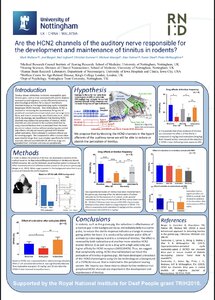
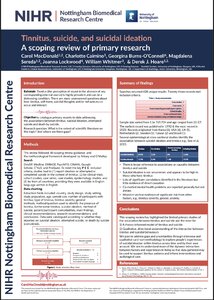
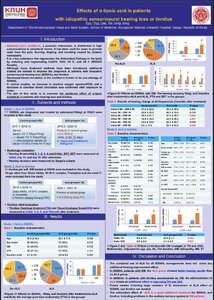
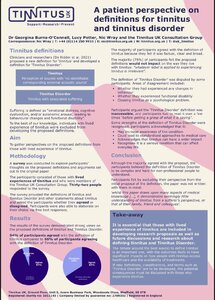


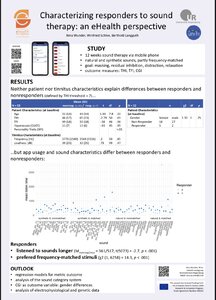

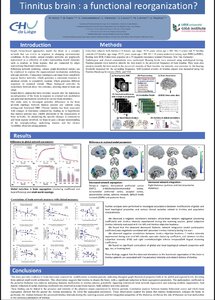
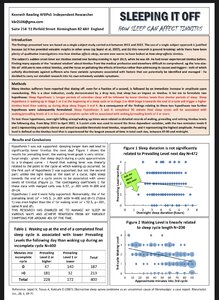
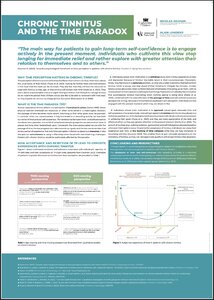
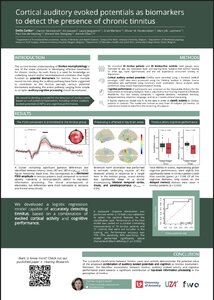
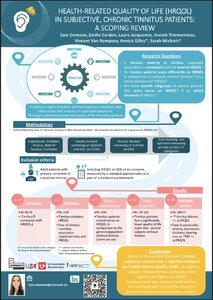
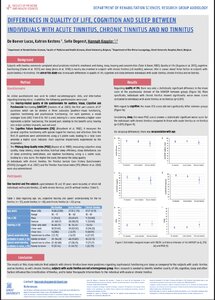
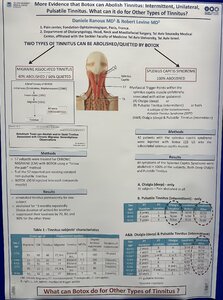
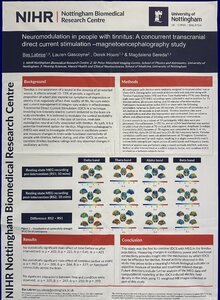

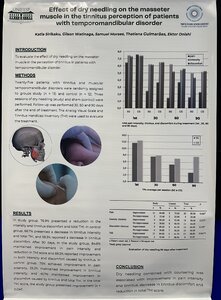
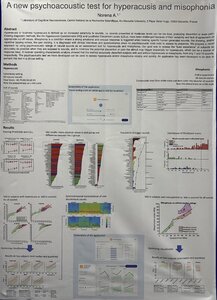
I couldn't catch all the posters though. A few were available in the conference app, and I photographed a few on site that seemed interesting, but they're rotating them twice per day so I also missed some of the batches due to recording/eating/networking/note taking, etc.
Anyway, here you go!



















- Jul 8, 2019
- 1,185
- Tinnitus Since
- 1991
- Cause of Tinnitus
- Loud Music / family history
Yes, it needs someone or a group to sit down, plan and delegate further research. Otherwise they all go off and do their own thing.your comment about wanting to see the speakers of these conferences debate rather than just present their own research is right on the mark.
- Oct 24, 2017
- 857
- Tinnitus Since
- 10/2017
- Cause of Tinnitus
- one-sided hearing loss (of unknown origin)
The conference has just finished! I recorded a bunch of stuff, and also collected slides from a few presenters, and will be sharing more over the coming days (perhaps weeks when it comes to video editing). But for now, I just want to share a few anecdotes.
I finally got to present today, as the very last speaker at the conference. (I've attached my slide deck once again for reference.) As suggested, I took a photo of the audience. For reference, that auditorium was way too large for the size of the conference and never more than half full or so. Furthermore, there was an other parallel session to the one I presented in. So, although you could definitely see the effects of being last, I was still reasonably happy with the turnout. And more people actually streamed in during my talk because the other parallel session ended earlier, so I ended with a larger audience for the last few minutes (no photo of that).

I recorded my talk and we will publish that later. For now, I want to share with you some of the reactions after my talk.
I was immediately accosted by two fairly senior psychologists. They were angry. The suggestion to put less money into psychological research was like blasphemy to them. Their reasoning was a bit odd, in my opinion, because they saw a direct connection between less research and less psychological support for tinnitus patients — whereas to me, research and clinical practice are two different things, and I never suggested that psychological support should not be offered in clinical practice. They also gave me a hard time about our survey results being a "biased sample" — indeed, our sample represents those who are struggling more than average, which are precisely those whose voices need to be heard the most. The discussion was fruitless and after some time I extracted myself.
On the bright side, thereafter multiple other (mostly younger) researchers thanked me for my talk; they found it helpful (and certainly not offensive!). There was even a younger psychologist who liked to talk too! I also received a few collaboration requests that we'll need to follow up on.
I also presented at the public event after the conference. It was a small affair and mostly about where tinnitus patients in Ireland can get help. I simply spoke a bit about my own tinnitus experience and Tinnitus Talk. Thereafter, @Joeseph Stope came up to me, and I was simply delighted to meet a forum member in person! He's a very kind older man. He explained that although he struggles with online money transactions, he has wanted to donate to us for some time, and gave me 250 EUR in cash. What a lovely gesture, it really warmed my heart, thank you Joeseph!
And thank you again to everyone else who helped us out financially with this trip. I have so many more thoughts, notes, slides, and recordings to share. But for now, I need an evening off!
Thank you again to this wonderful community, it's been a pleasure representing you here at the TRI conference in Dublin. I will leave you with this video from yesterday's conference dinner, with wonderful Irish music and dancing. There was even some dancing later by researchers, but I will spare you that image
I finally got to present today, as the very last speaker at the conference. (I've attached my slide deck once again for reference.) As suggested, I took a photo of the audience. For reference, that auditorium was way too large for the size of the conference and never more than half full or so. Furthermore, there was an other parallel session to the one I presented in. So, although you could definitely see the effects of being last, I was still reasonably happy with the turnout. And more people actually streamed in during my talk because the other parallel session ended earlier, so I ended with a larger audience for the last few minutes (no photo of that).
I recorded my talk and we will publish that later. For now, I want to share with you some of the reactions after my talk.
I was immediately accosted by two fairly senior psychologists. They were angry. The suggestion to put less money into psychological research was like blasphemy to them. Their reasoning was a bit odd, in my opinion, because they saw a direct connection between less research and less psychological support for tinnitus patients — whereas to me, research and clinical practice are two different things, and I never suggested that psychological support should not be offered in clinical practice. They also gave me a hard time about our survey results being a "biased sample" — indeed, our sample represents those who are struggling more than average, which are precisely those whose voices need to be heard the most. The discussion was fruitless and after some time I extracted myself.
On the bright side, thereafter multiple other (mostly younger) researchers thanked me for my talk; they found it helpful (and certainly not offensive!). There was even a younger psychologist who liked to talk too! I also received a few collaboration requests that we'll need to follow up on.
I also presented at the public event after the conference. It was a small affair and mostly about where tinnitus patients in Ireland can get help. I simply spoke a bit about my own tinnitus experience and Tinnitus Talk. Thereafter, @Joeseph Stope came up to me, and I was simply delighted to meet a forum member in person! He's a very kind older man. He explained that although he struggles with online money transactions, he has wanted to donate to us for some time, and gave me 250 EUR in cash. What a lovely gesture, it really warmed my heart, thank you Joeseph!
And thank you again to everyone else who helped us out financially with this trip. I have so many more thoughts, notes, slides, and recordings to share. But for now, I need an evening off!
Thank you again to this wonderful community, it's been a pleasure representing you here at the TRI conference in Dublin. I will leave you with this video from yesterday's conference dinner, with wonderful Irish music and dancing. There was even some dancing later by researchers, but I will spare you that image

Attachments
I was immediately accosted by two fairly senior psychologists. They were angry.



- Dec 3, 2022
- 256
- Tinnitus Since
- 2012. Worsened 2022.
- Cause of Tinnitus
- Primarily loud music. Secondary - ETD + TMJ
You're a star. Thank you for calling out these charlatans.I was immediately accosted by two fairly senior psychologists. They were angry.
haha ear go eeee
Member
Me laughing at the psychologists because Jastreboff's shit is finally being challenged:I was immediately accosted by two fairly senior psychologists. They were angry. The suggestion to put less money into psychological research was like blasphemy to them.
Joshua Macleod
Member
Hazel, you're a star. Thank you for representing us and for liaising with these researchers directly.The conference has just finished!
That conversation with the senior psychologists is so indicative of senior academics. They have a vested interest and are frightened of having their comfortable positions challenged. Thank you for making them uncomfortable; they and their clinical colleagues certainly need the wake-up call.
- Feb 11, 2019
- 801
- Tinnitus Since
- 01/2014
- Cause of Tinnitus
- Headcold/Flu
SAY WHAT - RIDDLE ME THAT, as Robin would say to Batman.I was immediately accosted by two fairly senior psychologists. They were angry. The suggestion to put less money into psychological research was like blasphemy to them. Their reasoning was a bit odd, in my opinion, because they saw a direct connection between less research and less psychological support for tinnitus patients
Much kudos regarding your courage in confronting what, to me, was an all-too-common, classic instance of gobbledygook masquerading as Legitimate Academic Discourse.
Did they mean that transferring the funds earmarked for these pointless and frankly stupid psychological Clinical Trials (like trying to determine precisely to what extent this brought people to dangerous suicidal ideation) to Real Research would somehow deprive sufferers of the wider availability of CBT?
Their scarcely comprehensible high dudgeon is such an obvious manifestation of their threatened awareness that the gathering momentum of Real Research will eventually render them superannuated and jobless. Jastreboff has on a number of occasions unwittingly indicated as much. Perhaps they should jump ship now and find another focus, such as the "counseling" of Incels (like that guy in Idaho who stabbed those three college women.)
You should feel tremendously proud of what you have achieved. This reminds me of that insight that the great American historian Howard Zinn had, that all of the Noble American Causes and Movements (Women's Right to Vote, The Labor Movement, The Civil Rights Movement, AA's Universal Twelve Step Program) were all started by unknown grass-roots citizens who were finally fed up with their situations, and not from any Governmental Initiatives.
- Jul 8, 2019
- 1,185
- Tinnitus Since
- 1991
- Cause of Tinnitus
- Loud Music / family history
What an uplifting story. Props to @Joeseph Stope!Thereafter, @Joeseph Stope came up to me, and I was simply delighted to meet a forum member in person! He's a very kind older man. He explained that although he struggles with online money transactions, he has wanted to donate to us for some time, and gave me 250 EUR in cash. What a lovely gesture, it really warmed my heart, thank you Joeseph!
- Nov 5, 2022
- 344
- Tinnitus Since
- Mild since 1982 - then Severe Oct 2022
- Cause of Tinnitus
- Microsuction (Oct 2022)
Well done @Hazel!The conference has just finished! I recorded a bunch of stuff, and also collected slides from a few presenters, and will be sharing more over the coming days (perhaps weeks when it comes to video editing). But for now, I just want to share a few anecdotes.
I finally got to present today, as the very last speaker at the conference. (I've attached my slide deck once again for reference.) As suggested, I took a photo of the audience. For reference, that auditorium was way too large for the size of the conference and never more than half full or so. Furthermore, there was an other parallel session to the one I presented in. So, although you could definitely see the effects of being last, I was still reasonably happy with the turnout. And more people actually streamed in during my talk because the other parallel session ended earlier, so I ended with a larger audience for the last few minutes (no photo of that).
View attachment 55100
I recorded my talk and we will publish that later. For now, I want to share with you some of the reactions after my talk.
I was immediately accosted by two fairly senior psychologists. They were angry. The suggestion to put less money into psychological research was like blasphemy to them. Their reasoning was a bit odd, in my opinion, because they saw a direct connection between less research and less psychological support for tinnitus patients — whereas to me, research and clinical practice are two different things, and I never suggested that psychological support should not be offered in clinical practice. They also gave me a hard time about our survey results being a "biased sample" — indeed, our sample represents those who are struggling more than average, which are precisely those whose voices need to be heard the most. The discussion was fruitless and after some time I extracted myself.
On the bright side, thereafter multiple other (mostly younger) researchers thanked me for my talk; they found it helpful (and certainly not offensive!). There was even a younger psychologist who liked to talk too! I also received a few collaboration requests that we'll need to follow up on.
I also presented at the public event after the conference. It was a small affair and mostly about where tinnitus patients in Ireland can get help. I simply spoke a bit about my own tinnitus experience and Tinnitus Talk. Thereafter, @Joeseph Stope came up to me, and I was simply delighted to meet a forum member in person! He's a very kind older man. He explained that although he struggles with online money transactions, he has wanted to donate to us for some time, and gave me 250 EUR in cash. What a lovely gesture, it really warmed my heart, thank you Joeseph!
And thank you again to everyone else who helped us out financially with this trip. I have so many more thoughts, notes, slides, and recordings to share. But for now, I need an evening off!
Thank you again to this wonderful community, it's been a pleasure representing you here at the TRI conference in Dublin. I will leave you with this video from yesterday's conference dinner, with wonderful Irish music and dancing. There was even some dancing later by researchers, but I will spare you that image
Thank you for once again being our cumulative voice, and giving us the glimmer and chance of hope we all need.
- Mar 14, 2022
- 119
- Tinnitus Since
- 2017
- Cause of Tinnitus
- Long-term noise trauma
Hello @Hazel,
What did you think of this 2023 conference compared with previous years?
Compared with previous years, do you feel that doctors/researchers are close to finding effective solutions?
Do you feel that doctors have a better understanding of tinnitus and especially pain hyperacusis?
If we compare 2023 with 2019 (Taipei), has there been a great deal of progress?
What did you think of this 2023 conference compared with previous years?
Compared with previous years, do you feel that doctors/researchers are close to finding effective solutions?
Do you feel that doctors have a better understanding of tinnitus and especially pain hyperacusis?
If we compare 2023 with 2019 (Taipei), has there been a great deal of progress?

 Member
Member Founder
Founder